(完整)形容词的比较级和最高级
完整版)比较级最高级变化规则总结
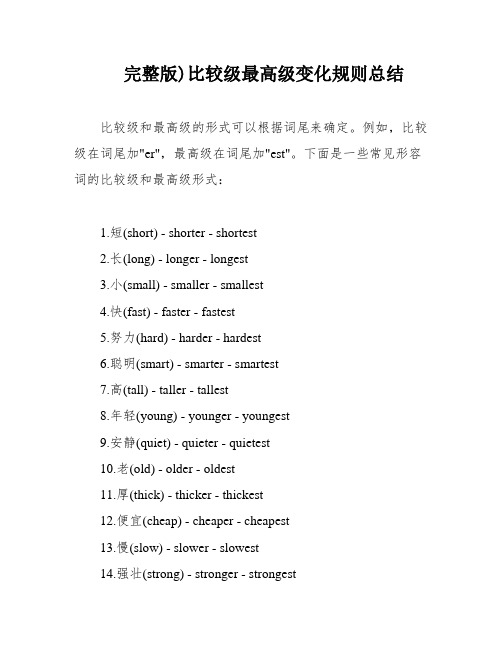
完整版)比较级最高级变化规则总结比较级和最高级的形式可以根据词尾来确定。
例如,比较级在词尾加"er",最高级在词尾加"est"。
下面是一些常见形容词的比较级和最高级形式:1.短(short) - shorter - shortest2.长(long) - longer - longest3.小(small) - smaller - smallest4.快(fast) - faster - fastest5.努力(hard) - harder - hardest6.聪明(smart) - smarter - smartest7.高(tall) - taller - tallest8.年轻(young) - younger - youngest9.安静(quiet) - quieter - quietest10.老(old) - older - oldest11.厚(thick) - thicker - thickest12.便宜(cheap) - cheaper - cheapest13.慢(slow) - slower - slowest14.强壮(strong) - stronger - strongest15.弱(weak) - weaker - weakest16.新(new) - newer - newest17.温暖(warm) - warmer - warmest18.冷(cold) - colder - coldest19.凉爽(cool) - cooler - coolest20.害羞(shy) - shyer - XXX21.紧(tight) - tighter - tightest22.干净(clean) - cleaner - cleanest23.聪明(clever) - cleverer - cleverest对于以不发音"e"结尾的单音节词,比较级直接加"r",最高级直接加"st"。
完整)英语常见形容词及比较级、最高级变化一览表

完整)英语常见形容词及比较级、最高级变化一览表第一章:比较级和最高级的变化规则比较级和最高级是英语中常用的形容词变化形式。
下面是一张变化表,展示了规则变化的情况。
规则变化1.单音节和部分双音节词以“-er”和“-est”结尾,可以构成比较级和最高级。
例:tall → taller → XXX2.以“-y”结尾的单音节词,将“-y”变为“-i”,再加上“-er”和“-est”构成比较级和最高级。
例:happy → happier → happiest3.以辅音字母+y结尾的双音节词,将“y”变为“i”,再加上“-er”和“-est”构成比较级和最高级。
例:busy → busier → busiest4.多音节词和部分双音节词在比较级和最高级前面加上“more”和“most”。
例:beautiful → more beautiful → most beautiful需要注意的是,有些形容词变化形式不规则,需要特别记忆。
Bright。
broad。
cheap。
clean。
clever。
cold。
cool。
dark。
dear。
deep。
fast。
few。
great。
hard。
high。
kind。
light。
long。
loud。
low。
near。
new。
poor。
quick。
quiet。
rich。
short。
slow。
small。
smart。
soft。
strong。
sweet。
tall。
thick。
warm。
weak。
and young are all adjectives that can be compared in degree.To form the comparative degree。
add -er to the end of the adjective。
To form the superlative degree。
add -est to the end of the adjective。
For example。
(完整)形容词的比较级和最高级精品PPT资料精品PPT资料

比较级基本句型
2、表达“A和B一样”,用as…as的结构
A+be动词+as+形容词原级+as+B
I am as tall as you.
我和你一样高。
你和仙女一样美。 You are as beautiful as fairy.
表达“A不如B”用not as…as的结构。 A+be动词的否定形式+as+形容词原级+as…+B I am not as tall as you. 我没有你高。
我跳得没他高。 I don't jump as high as he.
★ as…as之间用原形,有than要有比较级
按语法规则,than后面的人称代词应当用主格,但口语当中有时会 用宾格代替主格。
He is more careful than I (me).
只有同类的事物才能比较 Her bag is bigger than mine.
不能说 Her bag is bigger than I.
The black dog is t_h_in_n_e_r (thin) than the white dog. This balloon is _b_ig_g_e_r (big) than yours. My bag is _he_a_v_ie_r (heavy) than yours. John is _s_tr_o_ng_e_r (strong) than Mike. I am _sh_o_r_te_r (short) than Lucy.
★ 不规则变化 good--better--best bad--worse--worst
He is more careful than I (me).
(完整版)比较级和最高级变化规则

四.形容词和的比较级和最高级的变化规则类似。
规则变化如下构成规则例词一般情况,在单音节或双音节词的词尾直接加-er, -esttall—taller—tallestgreat—greater—greatestnear—nearer—nearestsoon—sooner—soonesthard—harder—hardestfast—faster—fastest以不发音 e 结尾的单音节词,只加-r, -st large—larger—largest nice—nicer—nicestlate—later—latest以重读闭音节结尾,并且以一个元音字母加一个辅音字母结尾的单词,先双写最后这个辅音字母,再加-er,-estbig—bigger—biggesthot—hotter—hottestfat—fatter—fattest wet—wetter—wettestthin—thinner—thinnest以“辅音字母+y”结尾的单词,把 y 改为 i, 再加-er, -est happy—happier—happiestheavy—heavier—heaviesteasy—easier—easiestearly—earlier—earliest大部分双音节词和多音节词,在原级前面加 more, most 来构成比较级和最高级friendly—more friendly—most friendlyrelaxed—more relaxed—most relaxed important—more important—mostcarefully—more carefully—most carefully构成规则例词以形容词加-ly 构成的副词,在原形前加more, most 构成比较级和最高级 quickly—more quickly—most quickly easily—more easily—most easilyclearly—more clearly—most clearly形容词和副词的不规则变化。
形容词的比较级和最高级大全
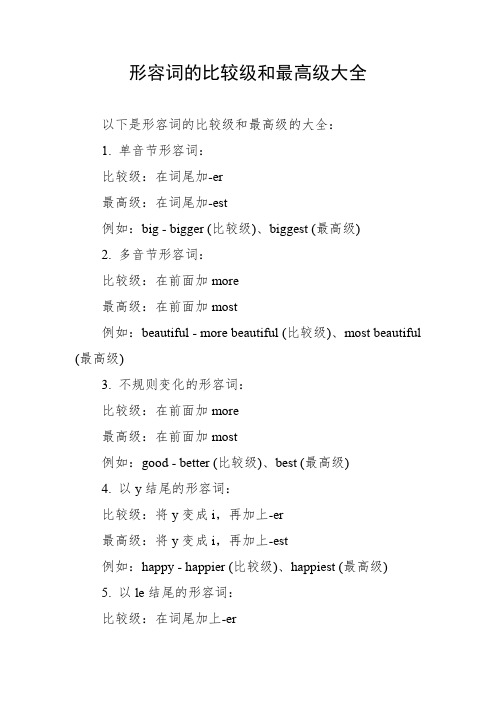
形容词的比较级和最高级大全以下是形容词的比较级和最高级的大全:1. 单音节形容词:比较级:在词尾加-er最高级:在词尾加-est例如:big - bigger (比较级)、biggest (最高级)2. 多音节形容词:比较级:在前面加more最高级:在前面加most例如:beautiful - more beautiful (比较级)、most beautiful (最高级)3. 不规则变化的形容词:比较级:在前面加more最高级:在前面加most例如:good - better (比较级)、best (最高级)4. 以y结尾的形容词:比较级:将y变成i,再加上-er最高级:将y变成i,再加上-est例如:happy - happier (比较级)、happiest (最高级)5. 以le结尾的形容词:比较级:在词尾加上-er最高级:在词尾加上-est例如:possible - more possible (比较级)、most possible (最高级)6. 少数不规则变化的形容词:比较级:在前面加more最高级:在前面加most例如:famous - more famous (比较级)、most famous (最高级)7. 特殊的比较级和最高级:例如:well - better (比较级)、best (最高级)8. 副词的比较级和最高级:比较级:在后面加-er最高级:在后面加-est例如:slowly - more slowly (比较级)、most slowly (最高级)以上是常见的形容词的比较级和最高级,但是也有一些不规则变化的形容词需要记忆。
同时,需要注意的是,有些形容词没有比较级和最高级,如unique。
形容词的比较级和最高级

形容词的比较级和最高级形容词是一类用来描述名词或代词特征的词语,它可以用来表达事物的大小、高度、速度、程度等属性。
在英语中,形容词有三种级别:原级、比较级和最高级。
形容词的比较级和最高级可以用来对两个或多个事物进行比较,以表达它们在某种属性上的差异。
一、形容词的比较级形容词的比较级用来比较两个事物在某个属性上的大小、高度或程度。
一般来说,形容词的比较级可以通过在形容词前加上“-er”来构成。
如果形容词以“e”结尾,只需在后面加上“-r”;如果形容词以辅音字母加“y”结尾,则将“y”变为“i”,再加上“-er”。
例如:1. 高→ 高的→ 更高的(tall → taller)2. 大→ 大的→ 更大的(big → bigger)3. 漂亮→ 漂亮的→ 更漂亮的(beautiful → more beautiful)4. 智慧→ 智慧的→ 更智慧的(intelligent → more intelligent)如果形容词以重读闭音节结尾,且末尾只有一个辅音字母时,则需将最后一个辅音字母双写,并在后面加上“-er”。
例如:1. 适中→ 适中的→ 更适中的(fit → fitter)需要注意的是,有一些形容词的比较级是不规则的,需要单独记忆。
下面是一些常见的不规则比较级形式:1. 好→ 好的→ 更好的(good → better)2. 小→ 小的→ 更小的 (l ittle → less)3. 多→ 多的→ 更多的(many → more)4. 远→ 远的→ 更远的(far → farther/further)形容词的比较级在句子中一般用于比较两个事物之间的差异。
比较级可以与"than"搭配使用,构成比较结构。
例如:1. 这本书比那本书更有趣。
(This book is more interesting than that book.)2. 这座建筑物比那座建筑物高得多。
(This building is much tallerthan that building.)二、形容词的最高级形容词的最高级用来表达一组事物中某个属性的极限。
(完整版)八上英语常见及各类型形容词比较级最高级总结
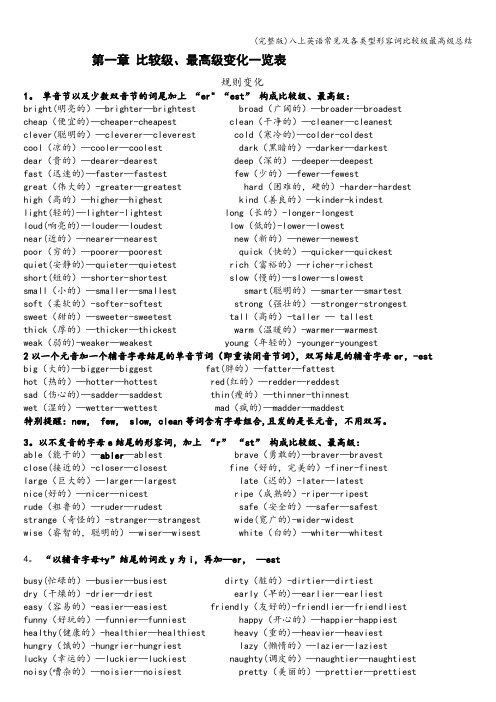
第一章比较级、最高级变化一览表规则变化1。
单音节以及少数双音节的词尾加上“er" “est”构成比较级、最高级:bright(明亮的)—brighter—brightest broad(广阔的)—broader—broadestcheap(便宜的)—cheaper-cheapest clean(干净的)—cleaner—cleanest clever(聪明的)—cleverer—cleverest cold(寒冷的)—colder-coldestcool(凉的)—cooler—coolest dark(黑暗的)—darker—darkestdear(贵的)—dearer-dearest deep(深的)—deeper—deepestfast(迅速的)—faster—fastest few(少的)—fewer—fewestgreat(伟大的)-greater—greatest hard(困难的,硬的)-harder-hardesthigh(高的)—higher—highest kind(善良的)—kinder-kindestlight(轻的)—lighter-lightest long(长的)-longer-longestloud(响亮的)—louder—loudest low(低的)-lower—lowestnear(近的)—nearer—nearest new(新的)—newer—newestpoor(穷的)—poorer—poorest quick(快的)—quicker—quickestquiet(安静的)—quieter—quietest rich(富裕的)—richer-richestshort(短的)—shorter-shortest slow(慢的)—slower—slowestsmall(小的)—smaller—smallest smart(聪明的)—smarter—smartestsoft(柔软的)-softer-softest strong(强壮的)—stronger-strongestsweet(甜的)—sweeter-sweetest tall(高的)-taller — tallest thick(厚的)—thicker—thickest warm(温暖的)-warmer—warmestweak(弱的)-weaker—weakest young(年轻的)-younger-youngest2以一个元音加一个辅音字母结尾的单音节词(即重读闭音节词),双写结尾的辅音字母er,-est big(大的)—bigger—biggest fat(胖的)—fatter—fattesthot(热的)—hotter—hottest red(红的)—redder—reddestsad(伤心的)—sadder—saddest thin(瘦的)—thinner-thinnestwet(湿的)—wetter—wettest mad(疯的)—madder—maddest特别提醒:new, few, slow, clean等词含有字母组合,且发的是长元音,不用双写。
形容词副词比较级最高级变化形式归纳(超全)
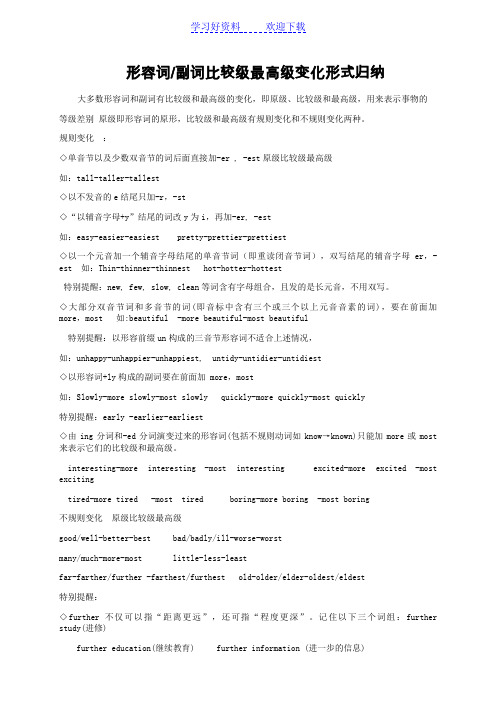
形容词/副词比较级最高级变化形式归纳大多数形容词和副词有比较级和最高级的变化,即原级、比较级和最高级,用来表示事物的等级差别原级即形容词的原形,比较级和最高级有规则变化和不规则变化两种。
规则变化:◇单音节以及少数双音节的词后面直接加-er , -est原级比较级最高级如:tall-taller-tallest◇以不发音的e结尾只加-r,-st◇“以辅音字母+y”结尾的词改y为i,再加-er, -est如:easy-easier-easiest pretty-prettier-prettiest◇以一个元音加一个辅音字母结尾的单音节词(即重读闭音节词),双写结尾的辅音字母er,-est 如:Thin-thinner-thinnest hot-hotter-hottest特别提醒:new, few, slow, clean等词含有字母组合,且发的是长元音,不用双写。
◇大部分双音节词和多音节的词(即音标中含有三个或三个以上元音音素的词),要在前面加more,most 如:beautiful -more beautiful-most beautiful特别提醒:以形容前缀un构成的三音节形容词不适合上述情况,如:unhappy-unhappier-unhappiest, untidy-untidier-untidiest◇以形容词+ly构成的副词要在前面加 more,most如:Slowly-more slowly-most slowly quickly-more quickly-most quickly特别提醒:early -earlier-earliest◇由ing分词和-ed分词演变过来的形容词(包括不规则动词如know→known)只能加more或most 来表示它们的比较级和最高级。
interesting-more interesting -most interesting excited-more excited -most excitingtired-more tired -most tired boring-more boring -most boring不规则变化原级比较级最高级good/well-better-best bad/badly/ill-worse-worstmany/much-more-most little-less-leastfar-farther/further -farthest/furthest old-older/elder-oldest/eldest特别提醒:◇further不仅可以指“距离更远”,还可指“程度更深”。
(完整版)比较级和最高级

(完整版)比较级和最高级一、形容词的比较级和最高级变化规则;1、规则变化:(1) 单音节词和少数双音节词一般在词尾加er或est:如: small ---smaller --- the smallest(2) 以不发音的e字母结尾的加r,或st:如: late --- later --- the latest(3) 以辅音字母加y结尾的变y为I加er或est:如: easy --- easier --- the easiest(4)以一个辅音字母结尾的重读闭音节词双写最后一个辅音字母再加er或est:如: big --- bigger --- the biggest以er,ow结尾的双音节词加er 或est如: slow --- slower --- the slowest(5) 多音节词前加more或most, 副词最高级前省略the.如: important --- more important --- the most important2.不规则变化good / well --- better --- the best 好bad / badly / ill --- worse --- the worst 坏many / much --- more --- the most 多little --- less --- the least 少old --- older / elder --- the oldest / the oldest 老, 旧far --- farther / further --- the farthest / the furthest 远常见形容词比较级、最高级变化一览表1.在形容词词尾加上“er”“est”构成比较级、最高级:bright(明亮的)—brighter—brightest broad(广阔的)—broader—broadest cheap(便宜的)—cheaper—cheapest clean (干净的)—cleaner—cleanestclever(聪明的)—cleverer—cleverest cold(寒冷的)—colder—coldest cool(凉的)—cooler—coolest dark(黑暗的)—darker—darkest deep(深的)—deeper—deepest fast(迅速的)—faster—fastestfew(少的)—fewer—fewest great(伟大的)—greater—greatest hard(困难的,硬的)—harder—hardest high(高的)—higher—highest kind(善良的)—kinder—kindest light(轻的)—lighter—lightest long(长的)—longer—longest loud(响亮的)—louder—loudestlow(低的)—lower—lowest near(近的)—nearer—nearest new(新的)—newer—newest poor(穷的)—poorer—poorestquick(快的)—quicker—quickest quiet(安静的)—quieter—quietestrich(富裕的)—richer—richest short(短的)—shorter—shortestslow(慢的)—slower—slowest small(小的)—smaller—smallest smart(聪明的)—smarter—smartest soft(柔软的)—softer—softest strong(强壮的)—stronger—strongest sweet (甜的)—sweeter—sweetest tall(高的)-taller-tallest thick(厚的)—thicker—thickest warm(温暖的)—warmer—warmest weak(弱的)—weaker—weakest young(年轻的)—younger—youngest2.双写最后一个字母,再加上“er”“est”构成比较级、最高级:big(大的)—bigger—biggest fat(胖的)—fatter—fattesthot(热的)—hotter—hottest red(红的)—redder—reddestsad(伤心的)—sadder—saddest thin(瘦的)—thinner—thinnestwet(湿的)—wetter—wettest mad(疯的)—madder—maddest3.以不发音的字母e结尾的形容词,加上“r”“st”构成比较级、最高级:able(能干的)—abler—ablest brave(勇敢的)—braver—bravest close(接近的)—closer—closest fine(好的,完美的)—finer—finest large(巨大的)—larger—largest late(迟的)—later—latestnice(好的)—nicer—nicest ripe(成熟的)—riper—ripestrude(粗鲁的)—ruder—rudest safe(安全的)—safer—safest strange(奇怪的)—stranger—strangest wide(宽广的)—wider—widest wise(睿智的,聪明的)—wiser—wisest white(白的)—whiter—whitest4.以字母y结尾的形容词,把y改为i,再加上“er”“est”构成比较级、最高级:busy(忙碌的)—busier—busiest dirty(脏的)—dirtier—dirtiest dry(干燥的)—drier—driest early(早的)—earlier—earliest easy(容易的)—easier—easiest friendly(友好的)—friendlier—friendliest funny(好玩的)—funnier—funniest happy(开心的)—happier—happiest healthy(健康的)—healthier—healthiest heavy(重的)—heavier—heaviest hungry(饿的)—hungrier—hungriest lazy(懒惰的)—lazier—laziestlucky(幸运的)—luckier—luckiest naughty(调皮的)—naughtier—naughtiest noisy(嘈杂的)—noisier—noisiest pretty (美丽的)—prettier—prettiest silly(傻的)—sillier—silliest spicy(辣的)—spicier—spiciestthirsty(渴的)—thirstier—thirstiest ugly(丑的)—uglier—ugliest4.双音节、多音节形容词,在单词前面加上“more”“most”构成比较级、最高级:afraid(害怕的)—more afraid—most afraidbeautiful(美丽的)—more beautiful—most beautifulcareful(仔细的)—more careful—most carefulcheerful(开心的)—more cheerful—most cheerfulcrowded(拥挤的)—more crowded—most crowdeddangerous(危险的)—more dangerous—most dangerous delicious(美味的)—more delicious—most deliciousdifficult(困难的)—more difficult—most difficultexciting(令人兴奋的)—more exciting—most excitingexpensive(昂贵的)—more expensive—most expensivefamous(著名的)—more famous—most famousfrightened(受惊的)—more frightened—most frightened frightening(令人害怕的)—more frightening—most frighteninghard-working(勤奋的)—more hard-working—most hard-workinghelpful(有帮助的)—more helpful—most helpfulhonest(诚实的)—more honest—most honestimportant(重要的)—more important—most importantinteresting(有趣的)—more interesting—most interesting polite(有礼貌的)—more polite—most politeterrible(可怕的)—more terrible—most terribletired(累的)—more tired—most tired5.不规则变化的形容词:bad(坏的)—worse—worst good(好的)—better—bestfar(远的)—farther—farthest (far—further—furthest)ill(病的)—worse—worst little(少的)—less—leastmany(多的)—more—most much(多的)—more—most old(年老的)—older—oldest ( old—elder—eldest)well(好的,身体好的)—better—best一. 写出下列形容词或副词的比较级和最高级.bad ________________ ______________________________clean ________________ ______________________________ famous ______________ _______________________dirty _________________ ______________________________big __________________ _____________________________small _________________ ______________________________heavy _____________ ______________________little __________________ ______________________________hard __________________ ______________________________ happy _________________ ______________________________far ___________________ ______________________________ expensive _____________________ ________________________________ well _________________ ______________________________easy __________________ ______________________________ wide ___________________ _______________________________ young _________________ ________________________________ rude ___________________ ________________________________ cheap ___________________ _______________________________ ugly __________________ _________________________________ busy ___________________ ________________________________ old ____________________ _________________________________ noisy __________________ _________________________________ interesting _____________________ _______________________________ hot ____________________ _________________________________ cold ___________________ _________________________________ many __________________ ________________________________ bright __________________ _______________________________ boring __________________ _______________________________ difficult _______________________ ________________________________ beautiful _______________________ _____________________________thin _____________________ _______________________________ good ____________________ _______________________________ strong____________________ ______________________________ high _________________ _______________________warm ________________ _______________________late __________________ _______________________weak _________________ ______________________tall ___________________ ______________________short __________________ ______________________loud ___________________ ______________________lazy ___________________ ______________________quick __________________ ______________________angry __________________ ______________________clever __________________ ______________________smart __________________ ______________________low ____________________ __________________二、选择填空1. Which does Jimmy like _____ , Chinese or Art?A. wellB. bestC. betterD. much2. The Changjiang River is one of _____ in the world.A. the longest riverB. longest riversC. the longest riversD. longer rivers3. _____ of the two women is Mrs Brown.A. The beautifulB. The more beautifulC. More beautifulD. The most beautiful4. My mooncake is nicer _____ his.A. likeB. withC. forD. than5. You are fatter than _____ .A. heB. hisC. himD. he is tall6. He jumps _____ of the three.A. farB. furtherC. farthestD. furthest7. My hair is longer than _____ .A. my sisterB. KateC. my brother’sD. Lucys’8. There are _____ paper here .Please bring some.A. littleB. lessC. fewerD. a little9. The pen is _____ than that one.A. more cheapB. cheapC. much cheaperD. quite cheaper10.Tom speaks Chinese _____ better than Jimmy.A. moreB. veryC. a lot ofD. much11.There are _____ girls in Class Two than in Class Four.A. moreB. nicestC. mostD. best12.It’s too _____ for you to do that.A. easyB. more dangerousC. harderD. the easiest13.Who has _____ apples now, Jim, Lily or Lucy?A. muchB. biggestC. betterD. the most14.You have more rulers than me. But _____ are nicer than _____ .A. mine, yoursB. mine, yourC. my, yoursD. my, your15.Tingting is _____ than Meimei, but Meimei is _____ than Tingting.A. all, strongerB. taller, strongestC. tallest, strongD. taller, stronger16.Mother is _____ in my family.A. busyB. busierC. the busiestD. more busy17.There are _____ in the park on Sunday.A. more childrenB. a lot of peopleC. much men and womenD. many peoples18.-This blue sweater is too big for me .-Will you please show me a _____ one?A. smallB. smallerC. the smallestD. smallest19.No one is _____ Mary in the class.A. so tallest asB. as taller asC. so high asD. so tall as20. This bike is _____ than that one.A. twenty yuan dearB. twenty yuan dearerC. dear twenty yuanD. dearer twenty yuan[参考答案] CCDDA CDBCD AADAD CBBDB三、用所给词的适当形式填空1.Your classroom is _____ (wide) and _____ (bright) than ours.2.There are _____ (few) hours of sunlight a day in winter than in summer.3.Which do you like _____ (well) , maths or chemistry?4.This is the _____ (good) film I have ever seen.5.Africa is the second _____ (large) continent.6.What he said made his mother much _____ (angry) .7.I’m not as _____ (careful) as he.8.We’ve got as _____ (many) books as we need.9.Pratice as _____ (much) as you can.10.They have done _____ (much) work with _____ (little) money.11.You’re the _____ (kind) person I’ve ever met.12.He is _____ (young) than his two sisters.13.The _____ (old) I get, the _____ (strong) I seem to feel.14.The weather is getting _____ (warm) and _____ (warm) .15.Summer is _____ (hot) season of the year.[参考答案] 1. wider, brighter 2. fewer 3. better 4. best 5. largest 6. angry 7. careful 8. many 9. much 10. more, less 11. kindest 12. younger 13. older, stronger, 14. warmer, warmer 15. the hottest。
(完整)比较级最高级

(完整)比较级最高级形容词、副词的比较级和最高级的构成和用法。
(一)比较级和最高级的构成:1力口-er,-est构成比较级和最高级。
[1]单音节形容词和副词high-higher-highesthard-harder-hardest[2]以不发音的-e结尾的safe-safer-safestlate-later-latest【3】辅音字母要双写的情况:big-bigger-biggesthot-hotter-hottest[4]以辅音加-y结尾的情况dry-drier-driestmerry-merrier-merrist2加more,most构成比较级和最高级。
[11多音节的形容词和副词expensive-more expensive-most expensivecareful ly-more carefully-most carefully[2]由形容词加-Iy构成的副词slowly-more slowly-most slowlyhighly-more highly-most highly[3]以-ful,-less,-able,-ous,-ive,-ing 等结尾的双音节形容useless-more useless-most uselessserious-more serious-most seriuos[4 ] 分词形容词tired,pleased 及glad,often,real,right,wrong 等单音节形容词tired-more tired-most tiredglad-more glad-most glad(3)形容词、副词的比较级和最高级的不规则构成法。
good/well-better-bestbad/ill/badly-worse-worstmany/much-more- mostIittle-Iess-Ieastfar-farther/further-farthest/furthestold-older/elder-oldest/eldest(二)比较级和最高级的用法1比较级的表示法:主语+be +比较级+than...;主语+谓语+ 比较级+than…(1)不同主语的比较:He is two years younger than LThis machine works better than that one.Li Ming studies harder than Wang Ling.(2)同一主语不同方面的比较:She is now happier than she has ever been.The exam was easier than we expected.We have had much more rain this year than last year.(3)用于修饰比较级的词:even,(very) much,far,a lot,stillThis book is much thicker than that one.He works even harder than before.2最高级的用法以及most/most I y/a Imost/at most的含义(1)形容词和副词最高级的用法三者或三者以上的比较用最高级。
(完整)英语常见形容词及比较级、最高级变化一览表

形容词第一章比较级、最高级变化一览表规则变化1.单音节以及少数双音节的词尾加上“er”“est”构成比较级、最高级:bright(明亮的)—brighter—brightest broad(广阔的)—broader—broadestcheap(便宜的)—cheaper—cheapest clean(干净的)—cleaner—cleanest clever(聪明的)—cleverer—cleverest cold(寒冷的)—colder—coldestcool(凉的)—cooler—coolest dark(黑暗的)—darker—darkestdear(贵的)—dearer—dearest deep(深的)—deeper—deepestfast(迅速的)—faster—fastest few(少的)—fewer—fewestgreat(伟大的)—greater—greatest hard(困难的,硬的)—harder—hardesthigh(高的)—higher—highest kind(善良的)—kinder—kindestlight(轻的)—lighter—lightest long(长的)—longer—longestloud(响亮的)—louder—loudest low(低的)—lower—lowestnear(近的)—nearer—nearest new(新的)—newer—newestpoor(穷的)—poorer—poorest quick(快的)—quicker—quickestquiet(安静的)—quieter—quietest rich(富裕的)—richer—richestshort(短的)—shorter—shortest slow(慢的)—slower—slowestsmall(小的)—smaller—smallest smart(聪明的)—smarter—smartestsoft(柔软的)—softer—softest strong(强壮的)—stronger—strongestsweet(甜的)—sweeter—sweetest tall(高的)-taller - tallest thick(厚的)—thicker—thickest warm(温暖的)—warmer—warmestweak(弱的)—weaker—weakest young(年轻的)—younger—youngest2以一个元音加一个辅音字母结尾的单音节词(即重读闭音节词),双写结尾的辅音字母er,-estbig(大的)—bigger—biggest fat(胖的)—fatter—fattesthot(热的)—hotter—hottest red(红的)—redder—reddestsad(伤心的)—sadder—saddest thin(瘦的)—thinner—thinnestwet(湿的)—wetter—wettest mad(疯的)—madder—maddest特别提醒:new, few, slow, clean等词含有字母组合,且发的是长元音,不用双写。
形容词的比较级和最高级
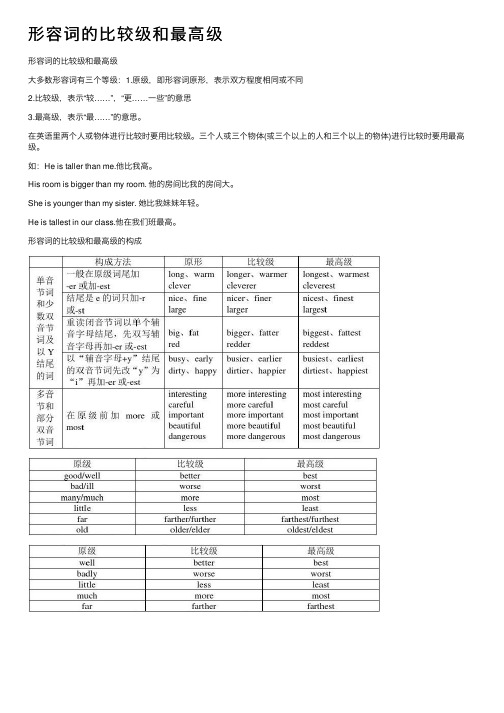
形容词的⽐较级和最⾼级形容词的⽐较级和最⾼级⼤多数形容词有三个等级:1.原级,即形容词原形,表⽰双⽅程度相同或不同2.⽐较级,表⽰“较……”,“更……⼀些”的意思3.最⾼级,表⽰“最……”的意思。
在英语⾥两个⼈或物体进⾏⽐较时要⽤⽐较级。
三个⼈或三个物体(或三个以上的⼈和三个以上的物体)进⾏⽐较时要⽤最⾼级。
如:He is taller than me.他⽐我⾼。
His room is bigger than my room. 他的房间⽐我的房间⼤。
She is younger than my sister. 她⽐我妹妹年轻。
He is tallest in our class.他在我们班最⾼。
形容词的⽐较级和最⾼级的构成形容词的⽤法:⼀、形容词原级的⽤法表⽰双⽅程度相同(即年龄、⾼矮等等)或不同时⽤形容词原级。
肯定式⽤as……as(和/与……⼀样)表⽰;否定式⽤not as……as或not so……as(和/与……不⼀样)表⽰。
as……as的中间⽤形容词和副词原级。
She is as tall as I.她和我⼀样⾼。
Lesson Five is as difficult as Lesson Four.第五课和第四课同样难。
He is not as old as you.他没有你那么⽼。
Lily is not as careful as Linda.莉莉不如琳达细⼼。
1.肯定句的句式结构是:A+be动词+as+形容词原级+as+B(表⽰A、B两者⽐较程度相同)。
This film is as interesting as that one.这部电影和那部电影⼀样有趣。
Her handwriting is as good as his.她的书写于他的⼀样好。
Mary is as careful as Linda.玛丽和琳达同样细⼼。
2.否定句的句式结构是:A+be动词+not+as+形容词原级+as+B(=A+be动词+not+so+形容词原级+as+B)(表⽰A、B两者程度不同,即A不如B那么……) Spring is not as/so cold as winter.春天不像冬天那么冷。
(完整)八年级英语上形容词比较级最高级
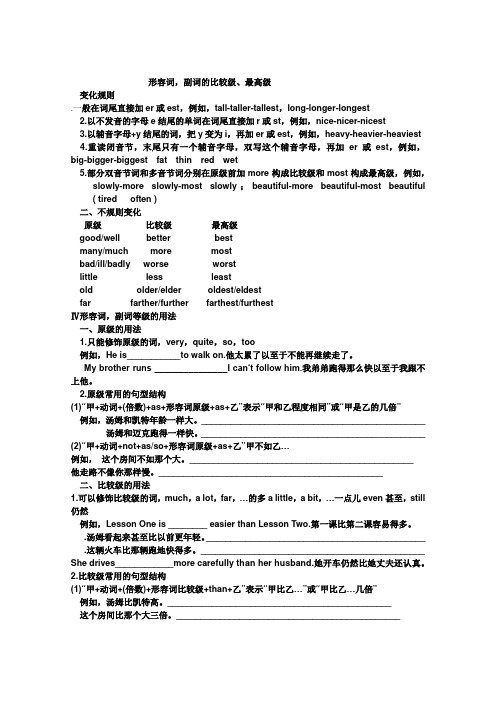
形容词,副词的比较级、最高级变化规则.一般在词尾直接加er或est,例如,tall-taller-tallest,long-longer-longest2.以不发音的字母e结尾的单词在词尾直接加r或st,例如,nice-nicer-nicest3.以辅音字母+y结尾的词,把y变为i,再加er或est,例如,heavy-heavier-heaviest4.重读闭音节,末尾只有一个辅音字母,双写这个辅音字母,再加er或est,例如,big-bigger-biggest fat thin red wet5.部分双音节词和多音节词分别在原级前加more构成比较级和most构成最高级,例如,slowly-more slowly-most slowly;beautiful-more beautiful-most beautiful ( tired often )二、不规则变化原级比较级最高级good/well better bestmany/much more mostbad/ill/badly worse worstlittle less leastold older/elder oldest/eldestfar farther/further farthest/furthestⅣ形容词,副词等级的用法一、原级的用法1.只能修饰原级的词,very,quite,so,too例如,He is___________to walk on.他太累了以至于不能再继续走了。
My brother runs _______________I can‘t follow him.我弟弟跑得那么快以至于我跟不上他。
2.原级常用的句型结构(1)“甲+动词+(倍数)+as+形容词原级+as+乙”表示“甲和乙程度相同”或“甲是乙的几倍”例如,汤姆和凯特年龄一样大。
______________________________________________ 汤姆和迈克跑得一样快。
(完整版)形容词和副词的比较级和最高级全面解析

形容词和副词的比较级和最高级形容词和副词的比较级和最高级的用法是初二上册新教材的重要考点,同时也是中考必须掌握的重要内容。
本文主要从形容词副词比较等级的变化、用法、及易错点三大方面对相关知识点进行详细解析,希望对同学们有所帮助。
一. 形容词和副词的比较级和最高级的变化方法如下:(1) 规则变化表:(2)几个不规则的形容词和副词的比较级和最高级如下表:二.形容词和副词比较级的基本用法注:如果动词是及物或不及物动词,则后面用副词;如果后面是连系动词,则后面用形容词。
如:This car is the fastest of the four.(形容词)(这辆汽车是四辆之中最快的) This car runs (the) fastest of the four.(副词)(这辆汽车是四辆之中跑得最快的)三.形容词副词比较级最高级的特殊用法(1)和冠词连用the +形容词原级+v(复),指一类人或物the + 形容词比较级,指两者中“较…的”的那一个,eg. the younger of the two a/ an +形容词比较级eg. The pen is expensive. I want a cheaper one. ( a) +most +形容词最高级 “非常…” eg. a most beautiful city (2)序数词与最高级连用,如:Flying is the fastest and the second cheapest way to travel. (3)比较级+than any other +n. (单) (适用于范围一致时)(all) other +n.(复)any +n.(单) (适用于范围不一致时) He is taller than any other student / all other students in his class. any student in my class. (4)倍数表达法。
(完整word版)英语比较级和最高级

形容词比较级和最高级的形式一、形容词比较级和最高级的构成形容词的比较级和最高级变化形式规则如下构成法原级比较级最高级①一般单音节词末尾加和②单音节词如果以结尾,只加和③闭音节单音节词如末尾只有一个辅音字母,须先双写这个辅音字母,再加和bighot sadderbiggerhotter saddestbiggesthottest④少数以或结尾的双音节词,末尾加和以结尾的词,如前是辅音字母,把y变成i,再加和,以结尾的词仍只加和CleverNarrowNoble angrierCleverernarrowernobler angriestcleverestnarrowestnoblest⑤其他双音节和多音节词都在前面加单词more和most different moredifferent mostdifferent1) The most high 〔A〕mountain in 〔B〕the world is Mount Everest,which is situated 〔C〕in Nepal and is〔D〕 .2) This house is spaciouser 〔A〕than that 〔B〕white 〔C〕one I bought in Rapid City,South Dakota 〔D〕last year.3) Research in the social 〔A〕sciences often proves difficulter 〔B〕than similar 〔C〕work in the physical 〔D〕sciences.二、形容词比较级或最高级的特殊形式:1. 三个或三个以上音节的形容词只能加more和most只能说more beautiful而不能说beautifuller; 只能说the most beautiful而不能说beautifullest。
但是,以形容前缀结尾的三音节形容词不适合上述情况,如unhappy,untidy,我们可以说:unhappier→unhappiest, untidier→untidiest2. 由分词和分词演变过来的形容词(包括不规则动词如know→known)只能加more或most来表示它们的比较级和最高级more(most) striking, more(most) interesting, more(most) wounded, more(most)worn等。
形容词的比较级及最高级
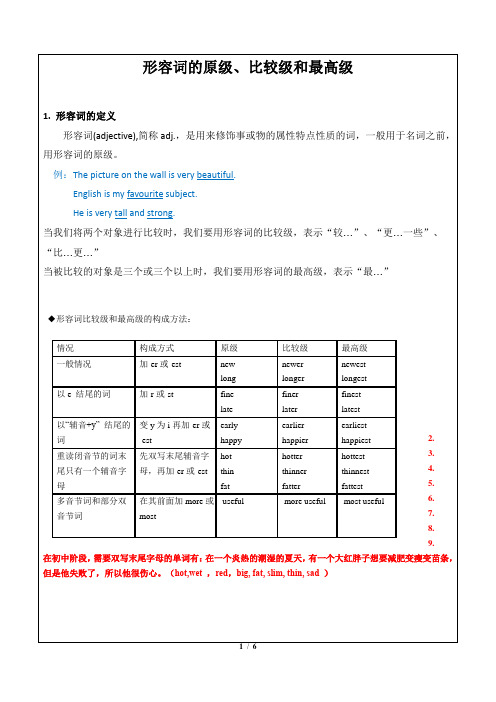
5. Alice writes ___________________(carefully) than I.
6.My sister doesn't write as _______________(good) as I do.
形容词最高级的用法
(1)三者或三者以上相比, 表示最高程度时, 用“the+最高级+表示范围的短语或从句” 的结构表示
其中表示范围的介词使用规律为:of或among接个体数量;in接范围。
(2)用于特殊句型中,如:one of +最高级+名词复数。
(3)用比较级的形式表达最高级的意思。
在这种情况下,往往是将一个人或是一件事与其他所有的人、物或其他任意一个人、物进行比较。
自己不可以与自己相比较,所以常在状语中用any 、other 、else类的字眼。
(4)形容词的最高级可以和序数词连用,表示“第……个最……(但是最高级前不能加first)。
(完整版)英语比较级和最高级
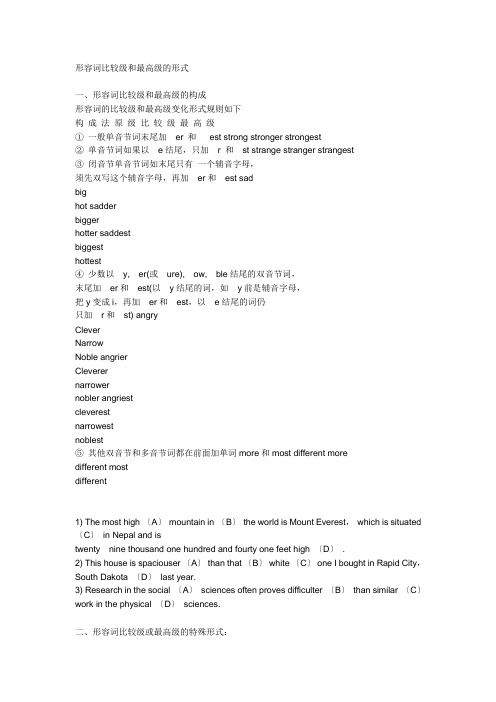
形容词比较级和最高级的形式一、形容词比较级和最高级的构成形容词的比较级和最高级变化形式规则如下构成法原级比较级最高级①一般单音节词末尾加er 和est strong stronger strongest②单音节词如果以e结尾,只加r 和st strange stranger strangest③闭音节单音节词如末尾只有一个辅音字母,须先双写这个辅音字母,再加er和est sadbighot sadderbiggerhotter saddestbiggesthottest④少数以y,er(或ure),ow,ble结尾的双音节词,末尾加er和est(以y结尾的词,如y前是辅音字母,把y变成i,再加er和est,以e结尾的词仍只加r和st) angryCleverNarrowNoble angrierCleverernarrowernobler angriestcleverestnarrowestnoblest⑤其他双音节和多音节词都在前面加单词more和most different moredifferent mostdifferent1) The most high 〔A〕mountain in 〔B〕the world is Mount Everest,which is situated 〔C〕in Nepal and istwenty nine thousand one hundred and fourty one feet high 〔D〕 .2) This house is spaciouser 〔A〕than that 〔B〕white 〔C〕one I bought in Rapid City,South Dakota 〔D〕last year.3) Research in the social 〔A〕sciences often proves difficulter 〔B〕than similar 〔C〕work in the physical 〔D〕sciences.二、形容词比较级或最高级的特殊形式:1. 三个或三个以上音节的形容词只能加more和most只能说more beautiful而不能说beautifuller; 只能说the most beautiful而不能说beautifullest。
- 1、下载文档前请自行甄别文档内容的完整性,平台不提供额外的编辑、内容补充、找答案等附加服务。
- 2、"仅部分预览"的文档,不可在线预览部分如存在完整性等问题,可反馈申请退款(可完整预览的文档不适用该条件!)。
- 3、如文档侵犯您的权益,请联系客服反馈,我们会尽快为您处理(人工客服工作时间:9:00-18:30)。
形容词的比较级和最高级英语中的形容词通常用三种形式来表达事物的等级差别,分别是原级、比较级和最高级。
大部分形容词的比较级和最高级是通过变化词尾来实现的,属于规则变化,但也有少数是不规则变化。
英语中有些形容词说明形状、材质等,还有形容词没有程度可分或其本身就表示某种程度,故而没有比较级和最高级。
常见的有:right 正确的 wrong 错误的 excellent 最好的 final 最后的last 最后的 possible 可能的 first 第一的 east 东方的empty 空的 wooden 木制的 impossible 不可能的 favourite 最喜欢的round 圆的 golden 金色的 square 方的一、比较级和最高级的构成1.规则变化(1)单音节和少数双音节形容词变化规则如下:1)单音节词末尾加-er(比较级),-est(最高级)【例】原级比较级最高级great greater greatestsmall smaller smallestclean cleaner cleanest2)单音节如以e结尾,只加-r(比较级),-st(最高级)【例】fine finer finestnice nicer nicestwide wider widest3)以一个辅音字母结尾的重读闭音节单音节词,须先双写这个辅音字母,再加-er(比较级),-est(最高级)【例】big bigger biggesthot hotter hottestfat fatter fattest4)以“辅音字母+y”结尾的双音节词,将y变为i,加-er(比较级),-est(最高级)【例】happy happier happiesteasy easier easiestheavy heavier heaviestfunny funnier funniest5)以-er,ow,-ble结尾的双音节词,末尾加-er(比较级),-est(最高级)【例】clever cleverer cleverestnarrow narrower narrowestable abler ablest(2)其他双音节词和多音节词在词前加more(比较级),most(最高级)【例】tired more tired most tiredinteresting more interesting most interestingdifficult more difficult most difficult(注意:A:有词根加ly构成的形容词,在词前加more(比较级),most(最高级)如friendly----friend+ly构成, friendly more friendly most friendly;B:以形容前缀un构成的三音节形容词不适合上述情况,如unhappy----unhappier----unhappiest,untidy----untidier----untidiest )2.不规则变化二、比较级的用法(1)高于或低于另一方的比较运用“比较级+than”的结构可以表达一方超过或低于另一方的情况。
即:物体A + am / are / is + 形比+ than + 物体B.She is more beautiful than my sister. 她比我的姐姐漂亮。
This bottle is bigger than that one. 这瓶子比那瓶子大。
(2)比较级+and+比较级这种结构表示事物本身程度的逐渐增长,意为“越来越...”。
She is becoming fatter and fatter. 她变得越来越胖。
It is getting warmer and warmer. 天气变得越来越暖和。
三、最高级的用法1.表示在三者或三者以上中程度最高最高级是表示在三者或更多者中程度最高的比较形式。
此时应运用形容词的最高级,其句式为:the+形容词最高级+(名词)+表示范围的短语或从句,即:物体A + am / are / is + the + 形最高级+ (名词)+比较范围(of + 人/物,in +地方)Lucy is the most beautiful girl in her school. 露西是她学校最漂亮的女孩。
Jim is the thinnest of the three boys. 吉姆是这三个男孩中最瘦的。
2.“最......”的其他表达方法。
(1)运用比较级表达最高级的概念。
Ann is taller than any other girl in her class.Ann is taller than the other girls in her class.Ann is taller than the rest of girls in her class.以上三句表达的意思等同于最高级的含义:Ann is the tallest of the girls in her class. 安是她们班上最高的女生。
四、比较级和最高级的修饰语1.比较级的修饰语修饰比较级的常用语和短语主要有:much(...得多),a lot(...得多), a little(...一点), a bit(...一点),twice(...两倍), five times(...五倍)等。
Do you feel much better today than yesterday?你今天感觉比昨天好很多了吗?2.最高级的修饰语常用的最高级的修饰语有序数词the first,the second等以及almost(差不多,几乎), nearly(差不多,几乎)。
Africa is the second largest continent. 非洲是第二大洲。
Amy’s writing is almost the best of all the students.在所有学生中,艾米的书写几乎是最好的。
五、需要注意的情况1.使用比较级时常见的错误(1)more 不可修饰比较级,但是much可以用来加强比较级,意为“...的多”、“更...”。
She looks more younger than I. (×)She looks much younger than I. (√)(2)比较的对象或范围出现错误。
The weather of Shanghai is hotter than Beijing. (×)(比较的对象应该是北京的天气,而不是北京)The weather of Shanghai is hotter than that of Beijing. (√)上海的天气比北京的热。
China is larger than any country in Asia. (×) (出现了逻辑上的错误,中国就是亚洲的一个国家,应当排除在外)China is larger than any other country in Asia. (√) 中国比亚洲别的国家要大。
2.形容词最高级前通常要加定冠词the,而以下几种情况一般不需要加定冠词the:(1)形容词最高级前有序数词、物主代词、指示代词或名词所有格等限定词修饰时,最高级前不用the。
如:The Yellow River is the second longest river in China.黄河是中国第二长河。
(2)形容词最高级在句中作表语而比较范围又不明确时,最高级前不用the。
如: They are happiest on Saturdays.他们在星期六最快乐。
(3)如果两个形容词最高级并列修饰同一个名词时,第二个形容词最高级前不加the。
如:He is the youngest and tallest boy in his class.他是班上年龄最小、个子最高的男孩。
练习形容词比较级和最高级(一)一、写出下列单词的反义词1. hot2.new________3. clean________4. high________5. heavy______6.cold_______7. bad______二、写出下列形容词的比较级和最高级1. old ______ ________2. busy ______ _______3. thin ________ ________4. many _____ _____5. slow ________ _____6. delicious _________ ______三、用适当形式填空:1. Bob is ________ ( young ) than Fred but __________ (tall) than Fred.2. Yingtian is not as ___________ (tall) asYongxian.3. Almost all the students' faces are the same but Li Deming looks _______ (fat) than before .4. Which is _________ (heavy), a hen or a chicken?5.-- How _________ (tall) is Sally?-- She' s 1.55 metres ________ (tall). What about Xiaoling? -- She' s only 1.40 metres ______ (tall). She is much _______(short) than Sally. She is also the _______ (short)girl in the class.6. He is ______ (bad) at learning maths. He is much _______ (bad) at Chinese and heis the _________ (bad) at English.7. Annie says Sally is the ________ (kind) person in the world.8.He is one of the_________(friendly) people in the class, I think.9. A dictionary is much _________ (expensive) than a story-book.10. An orange ia a little ______ (big) than an apple, but much ________ (small) thana watermelon.11.Miss Chen is __________ _________than Mr. Wang. (popular)12. Mr. Lin ________ ________ _________ Mr. Brown. (sad)13. The basketball _______ ________ ________ the baseball. (big)14. Question A _______ ________ _________ ________ Question B. (important)15. A rose ________ ________ __________ ________ a weed(野草). (beautiful)16. Toronto is _____ ______ city in Canada. (large)17. Playing computer games is______ _____ _____ of all the activities.(interesting).18. The Nile(尼羅河) is ______ ________river in the world. (long)19. Good health is _______ _______ ________thing life. (important)20. Taking a taxi is ______ _______ way to get to the airport. (easy)21. Test 1 is _____ _______ _________of all the tests. (difficult)22. He is ________than any other boy in the class.(clever)23. She is_______ than all the other students. (young)24. The window is ________ ________ of the two. (narrow)25. Where is the ________bus-stop? (near)26. He is one of ________ ________ _______Politicians. (famous)27. Tom drives much ________ ________than John. (careful)28. The white flower is ________(beautiful). The yellow flower is ______ _______ (beautiful)than the white flower. The red flower is the _____ ______ of the three.四、选择题1. She is ________ than ________ .A. busier / usB. busier / weC. more busy / usD. more busy / we2. Jane is ________ than Betty.A. less tallerB. less tallestC. less tallD. not as tall3. China is ________ country in the world.A. the third largestB. the largest thirdC. the third largeD. a third largest4. -Which is ____ season in Beijing?-I think it's autumn.A.goodB.betterC.bestD.the best5.- Which is__________ , the sun, the moon or the earth?-- Of course, the moon is.A.smallB.smallerC.smallestD.the smallest6.The air in Beijing is getting much _____ now than a few years ago.A. cleanB. cleanerC. cleanestD. the cleanest7. Mobile phones are very popular now and they are _____ than before.A. cheapB. cheaperC. cheapestD. the cheapest8.I study English as_______as my brother.A.hardB. harderC. hardest9. Which is _____ , a bicycle or a computer?A. expensiveB.more expensiveC.the most expensive10. The Yellow River is one of ______rivers in China.A longB longerC the longest11.She is the second _______student in our class.A. tallB. tallerC. talles形容词比较级和最高级(二)一、用括号里的词的适当形式填空。
